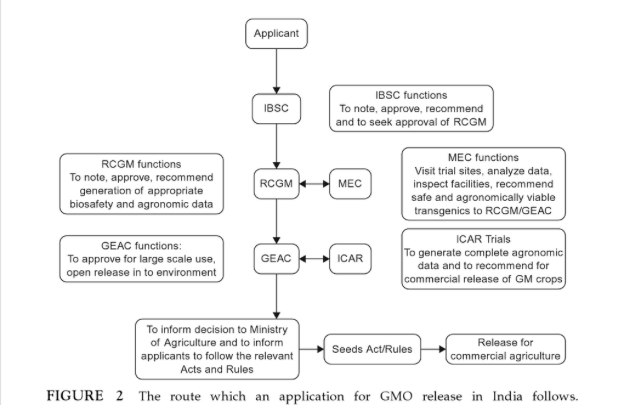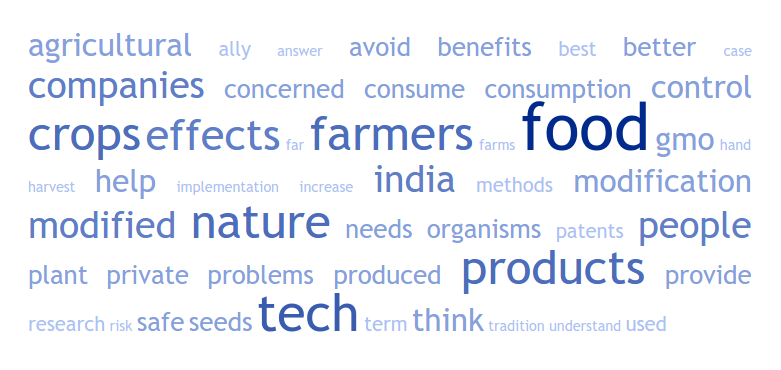Venkat1994 (Talk | contribs) |
Venkat1994 (Talk | contribs) |
||
| Line 27: | Line 27: | ||
[[File:Survey_comments.png|center|780x370px]] | [[File:Survey_comments.png|center|780x370px]] | ||
| − | |||
| − | |||
| − | |||
| − | |||
| − | |||
| − | |||
| − | |||
| − | |||
| − | |||
| − | |||
| − | |||
| − | |||
| − | |||
| − | |||
{{IIT-Madras-Bottom/CSS}} | {{IIT-Madras-Bottom/CSS}} | ||
Revision as of 12:57, 19 October 2016
GMO in India
Agriculture is demographically the broadest economic sector in India which accounts for approximately 13.7% GDP and 50% of the workforce (approx. 600 mil). The conventional technology currently in usage is not self-sufficient for the ever-growing population. It also requires usage of pesticides and insecticides which deteriorates the environment. Owing to the GM crops' high productivity, low pesticides and insecticides usage, drought resistance and high nutritional quality, we took the task of exploring more about the GM technology and creating awareness on both the fronts, pros and cons.
Currently in India, 93% of cotton grown is Bt cotton. There are several crops incl. rice, maize, mustard etc. are under field trials, with a huge ongoing debate scrutinizing its biosafety levels. For a new GM crop to be introduced, it has to go through many regulatory processes by the government.
Since most of the population is unaware about GM technology, we tried to understand the advantages and disadvantages of GM crops along with how it is tested for safety in India. This prompted us to investigate GMO related issues by reaching out to it's stakeholders, general public (consumers and farmers), NGOs and regulatory authorities. Our objectives were to answer following questions:
1. What percent of general public have heard of GMO and are aware of it's economical, technical and political implications?
2. What is the perception of public regarding the consumption of GM foods?
3. What do people believe as better in GM patenting regime of the country?
4. What makes a person opt for GM food consumption? Is it better knowledge and understanding of GM?
Considering these, we designed our survey. We conducted our survey in colleges of four different states with the help of SVCE Chennai, IISc Banglore, IIT Delhi and IIT Kharagpur (total 330 responses). We surveyed undergraduates, graduates and professors across various departments and later on categorized them into two groups Biotechnology related and non-Biotechnology related departments. We also made sure that we have enough responses in each category. You can view the survey questionnaire here.
Analysis
We believe that GM crops/foods would be a very important part of our life in the future, if not today. Genetic Modification technology would be developed to an extent that all of us would be satisfied with its technical, economical and political implications. In that regime, we believe that the answers to all of our questions would be 'YES'. Therefore, we have looked at the patterns, which give us 'YES' answers in our questionnaire. The percentage of people responding 'YES' have been color coded like: 0-40% red, 40-70% yellow, 70-100% green. In this way, we can also estimate that how close are we to go green! We found interesting results in accordance with our hypothesis. We had divided our participants into six groups: Undergraduates, Graduates and Professors, each from Biotech or non-Biotech. A comprehensive analysis of our results can be obtained here. Below is the tag cloud representation of the comments, which we received in our survey.



